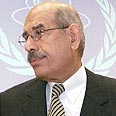
Nuke-catchers dream
After failing in Iraq, Mohammed ElBaradei's true test will be Iran
Compared to most Nobel laureates, especially the politicians amongst them, Mohammed ElBaradei, the head of the International Atomic Energy Agency (IAEA) appears on first glance a bit gray, a thorough technocrat, even a bit shy.
He seems to shy away from all the attention.
His lectures are also like that. ElBaradei gives over his message quietly and somewhat dryly, without getting excited.
His language is not particularly rich; he's more comfortable in a small, academic setting than on the international stage. The more than 2000 workers at the IAEA headquarters in Vienna call the big boss by his first name.
Limits of power
He well knows the limits of international law, and the par between nice legalistic ideals and the practical ability to enforce them.
His power and ability are mainly behind the scenes, in building international consensus, in making quiet deals, bridging, making concessions, in preventing conflict.
Even though he is Egyptian-born (and never hides it), he acts like a citizen of the world.
Unassuming change
Despite his unassuming nature – or perhaps because of it – ElBaradei has managed, in his own way, to affect real change in the image and functioning of the organization he took over in 1997.
He helped reestablish the IAEA as an important international body, which took upon itself the struggle against nuclear weapons in the name of the entire international community.
The Agency has become the first address for every nuclear issue facing the world today, from Iran and North Korea to nuclear terrorism.
Members-only
It wasn't always like this. Until the 1990s the IAEA functioned as a members-only club, whose ethos dictated the development of nuclear energy for peaceful purposes and almost completely ignored the possibility that nuclear weapons would spread.
It is true that part of the group's mandate was also to build an inspection apparatus to ensure countries who signed the Nuclear Non-proliferation Treaty kept to their commitments, but the trouble was that every monitoring group – like the treaty itself – was built on a gentleman's agreement, rather than on actual enforcement.
The Agency revealed its toothlessness when dealing with Iraq, when a member state came close to completing a nuclear weapon while receiving every possible stamp of approval from the IAEA.
The lessons of the Agency's colossal failure in Iraq were a turning point.
Following that catastrophe, its leaders had to act quickly; only a complete overhaul would save its place as a relevant international organization.
Quick action
ElBaradei understood this immediately, even before the organization's lawyers.
Under his quiet leadership, the IAEA has undergone deep and fundamental changes. He was one of the main architects of reform in the organization's inspections regime, and especially in establishing what is now called the "additional protocol" – all in an attempt to give some "teeth" to the weak enforcement capabilities of his organization.
The IAEA still has many critics, more than a few in Israel and the United States. They say the organization is weak, toothless and cannot fight the war against nuclear proliferation. They say this sort of fight cannot be effectively conducted by international organizations, but rather by committed nations.
Many people in the Bush administration don't trust ElBaradei or his Agency to be a front in the fight against a nuclear Iran. Washington even tried, unsuccessfully, to block his nomination for a second term.
Time will tell
The decision of the Nobel committee to award Mohamed ElBaradei is an expression of moral support for him and the IAEA. It is a call to strengthen normative multi-national tools to fight nuclear proliferation, and especially the fight currently under way against Iran.
At the end of the day, the Agency's results with regard to Iran will be the factor by which history determines whether the Nobel committee made a wise decision at the right moment, or whether it will go down as just one more example of political naiveté.
Avner Cohen is a researcher at the University of Maryland and the author of "The Last Taboo" and "Israel and the bomb".










